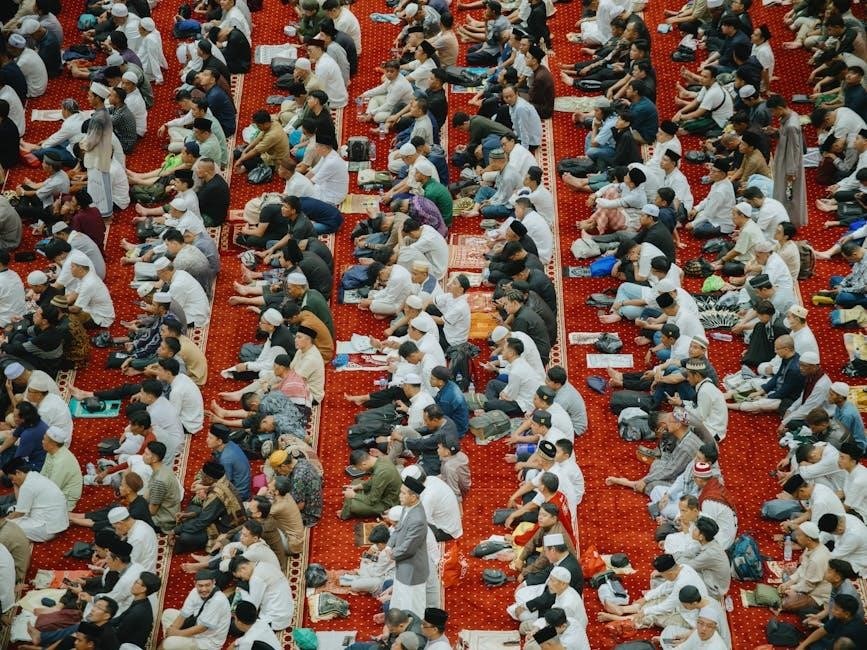
dua ahad pdf
Dua Ahad, a significant supplication in Shia Islam, is a heartfelt prayer seeking Imam Mahdi’s guidance and assistance. It emphasizes spiritual connection and divine support, offering believers a profound means to strengthen their faith and prepare for the Imam’s reappearance, as narrated by Imam Sadiq (a.s).
1.1. Definition and Significance
Dua Ahad, meaning “The Singular Supplication,” is a profound prayer in Shia Islam, specifically dedicated to expressing allegiance and devotion to Imam Mahdi (a.t.f.s.). It is a heartfelt invocation seeking divine assistance, guidance, and the opportunity to support the Imam during his reappearance. This supplication holds immense spiritual significance, as it strengthens the believer’s connection with the Imam and fosters a sense of readiness for his advent. Recited for 40 consecutive mornings, it is believed to grant the reciter a privileged status among the Imam’s helpers. Dua Ahad is a powerful tool for spiritual growth, emphasizing faith, loyalty, and preparation for the Imam’s divine mission.
1.2. Historical Context and Origin
Dua Ahad is deeply rooted in Shia Islamic traditions, tracing its origin to the esteemed Imam Sadiq (a.s.), who narrated this supplication as a means of seeking divine assistance and preparing for the advent of Imam Mahdi (a.t.f.s.). Historically, it has been a cherished prayer among Shia Muslims, emphasizing allegiance to the Imam and a longing for his reappearance. The supplication is believed to have been revealed to Imam Sadiq through divine inspiration, making it a significant part of Shia spiritual practices. Its historical significance lies in its role as a bridge between the believer and the awaited Imam, fostering hope and readiness among the faithful for the Imam’s divine mission.

The Purpose of Dua Ahad
Dua Ahad is a supplication seeking divine assistance and connection with Imam Mahdi, emphasizing spiritual growth and preparation for his reappearance, while asking for guidance and support.
2.1. Spiritual Connection with Imam Mahdi
Dua Ahad fosters a deep spiritual bond with Imam Mahdi, enabling believers to seek his divine guidance and support. By reciting this supplication, one strengthens their connection, expressing loyalty and devotion. It serves as a means to request Imam Mahdi’s intercession and assistance, nurturing a sense of closeness and spiritual reliance. The supplication is a powerful tool for believers to align their hearts and actions with the ideals of Imam Mahdi, seeking his blessings and protection in both worldly and spiritual matters. This connection is vital for those striving to live according to his teachings and preparing for his eventual reappearance.
2.2; Seeking Divine Assistance and Guidance
Dua Ahad is a powerful supplication seeking divine assistance and guidance, particularly in times of uncertainty. It serves as a heartfelt plea to Allah, asking for His intervention and support through the intercession of Imam Mahdi. By reciting this dua, believers express their reliance on Allah’s mercy and wisdom, seeking clarity and direction in their lives. The supplication also emphasizes the importance of surrendering to Allah’s will and trusting in His plan. Regular recitation fosters a sense of spiritual reliance, enabling individuals to navigate life’s challenges with faith and confidence. It is a profound means of connecting with the divine and seeking Imam Mahdi’s guidance in both spiritual and worldly matters.

Benefits of Reciting Dua Ahad
Dua Ahad offers spiritual growth and enlightens the soul, while preparing believers for Imam Mahdi’s reappearance, fostering a deeper connection with the divine purpose.
3.1. Spiritual Growth and Enlightenment
Reciting Dua Ahad fosters profound spiritual growth and enlightenment, purifying the soul and enlightening the heart. It strengthens one’s faith, humility, and connection with the divine. By seeking Imam Mahdi’s guidance, believers experience a deeper sense of purpose and proximity to Allah. This supplication nurtures self-reflection, fostering a stronger moral compass and inner peace. Regular recitation enhances spiritual awareness, preparing the individual for divine mercy and blessings. It also cultivates a mindset of gratitude and surrender, essential for spiritual elevation. Through Dua Ahad, one not only grows spiritually but also aligns their heart and actions with the divine will, seeking enlightenment and eternal grace.
3.2. Preparation for the Reappearance of Imam Mahdi
Dua Ahad serves as a powerful means of preparation for the awaited return of Imam Mahdi (a.t.f.s.). Reciting this supplication fosters a deep spiritual readiness to support the Imam’s divine mission. According to narrations, reciting Dua Ahad for 40 consecutive mornings ensures one’s role among Imam Mahdi’s helpers. It strengthens the believer’s commitment to justice and righteousness, aligning their actions with the Imam’s teachings. This supplication also nurtures a sense of responsibility and loyalty, enabling individuals to stand as steadfast supporters of the Imam. Through Dua Ahad, believers not only prepare themselves but also invite divine blessings to assist in the Imam’s cause, ensuring their readiness for his glorious reappearance.

How to Recite Dua Ahad Properly
Recite Dua Ahad with purity, facing Qibla, in a calm and sincere manner. Ideal to recite it 40 times, maintaining focus and devotion throughout.
4.1. Recommended Time and Conditions
The ideal time to recite Dua Ahad is in the early morning, fostering a spiritual start to the day. It is recommended to recite it with a clean intention, facing the Qibla, and in a state of physical and spiritual purity. Reciting it 40 consecutive mornings is highly emphasized, as it is believed to strengthen one’s spiritual connection and preparation for Imam Mahdi’s reappearance. A quiet, focused environment is advisable to maintain concentration and sincerity. Additionally, adhering to proper Islamic etiquette, such as wearing clean attire and avoiding distractions, enhances the supplication’s effectiveness and acceptance.
4.2. Etiquettes and Preparations
Reciting Dua Ahad requires specific etiquettes and preparations to ensure its effectiveness. It is recommended to perform Wudu (ablution) and face the Qibla while reciting. Wearing clean, modest clothing and maintaining a state of physical and spiritual purity are essential. One should also ensure a quiet, distraction-free environment to focus on the supplication. Reciting with sincerity, concentration, and a heartfelt intention is crucial. Additionally, it is advisable to recite the Quran before or after the supplication to enhance its impact. By adhering to these etiquettes, believers can deepen their connection with Imam Mahdi and seek divine blessings through this sacred prayer.

The Role of Dua Ahad in Islamic Spirituality
Dua Ahad holds a vital role in Islamic spirituality by fostering a deep connection with Imam Mahdi and seeking divine guidance, enhancing spiritual practices and faith.
5.1. Its Place in Shia Islamic Practices
Dua Ahad holds a prominent position in Shia Islamic practices, particularly as a supplication recited to strengthen one’s connection with Imam Mahdi. It is often recommended to be recited during specific times, such as the early mornings, and is considered a vital part of one’s daily rituals. In Shia communities, Dua Ahad is frequently recited in congregational settings, fostering a sense of unity and shared purpose among believers. Many Shia scholars emphasize its importance and encourage its regular recitation to maintain spiritual alignment and preparation for the Imam’s return. This practice is deeply ingrained in Shia spirituality, reflecting a commitment to both personal and communal devotion, and is often taught in Shia educational institutions to nurture faith from a young age.
5.2. Impact on Personal and Communal Worship
Dua Ahad profoundly influences both personal and communal worship, fostering a deeper spiritual connection and sense of responsibility among believers. On a personal level, it encourages individuals to reflect on their faith, seek divine guidance, and prepare for the Imam’s return. Communal recitation strengthens unity, as believers come together to express their devotion and shared aspirations. This collective practice not only enhances spiritual mindfulness but also reinforces the Shia community’s commitment to awaiting Imam Mahdi. Regular recitation of Dua Ahad cultivates a culture of hope, resilience, and mutual support, transforming individual and communal worship into a powerful expression of faith and anticipation.
Dua Ahad is a powerful supplication that strengthens spiritual bonds and prepares believers for Imam Mahdi’s return, offering divine guidance and fostering communal unity in anticipation.
6.1. Summary of Key Points
Dua Ahad is a powerful supplication in Shia Islam, emphasizing spiritual growth and divine assistance. It fosters a deep connection with Imam Mahdi, preparing believers for his reappearance. Reciting it for 40 mornings is highly recommended, as it strengthens faith and grants the reciter a role among Imam Mahdi’s helpers. The supplication seeks guidance, protection, and enlightenment, aligning with broader Islamic spiritual practices. Its significance lies in its ability to inspire personal and communal worship, fostering unity and devotion among believers. Regular recitation is encouraged to maximize its benefits and deepen one’s relationship with Allah and the Imam.
6.2. Encouragement for Regular Recitation
Regular recitation of Dua Ahad fosters a profound spiritual connection with Imam Mahdi and strengthens one’s faith. It is a powerful means of seeking divine assistance and preparation for the Imam’s reappearance. Consistency in reciting this supplication nurtures spiritual growth, enlightenment, and a deeper understanding of Islamic teachings. Believers are encouraged to maintain this practice diligently, as it not only enhances personal worship but also unites the community in a shared purpose. By committing to regular recitation, individuals can experience the transformative benefits of Dua Ahad, drawing closer to Allah and fulfilling their role as devoted followers of Imam Mahdi.
Related posts:
Archives
- February 2026
- January 2026
- December 2025
- November 2025
- October 2025
- September 2025
- August 2025
- July 2025
- June 2025
- May 2025
- April 2025
- March 2025
- February 2025
- January 2025
- December 2024
- November 2024
- October 2024
- September 2024
- August 2024
- July 2024
- June 2024
- May 2024
- April 2024
- March 2024
- February 2024
- January 2024
- December 2023
- November 2023
- October 2023
- September 2023
- August 2023
- July 2023
- June 2023
- May 2023
Leave a Reply
You must be logged in to post a comment.